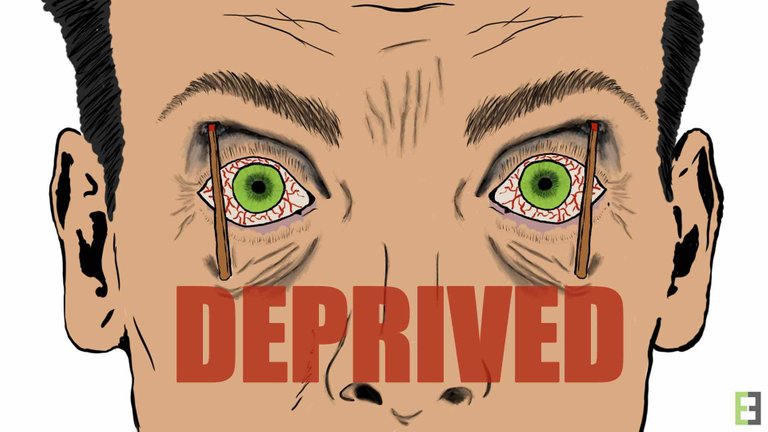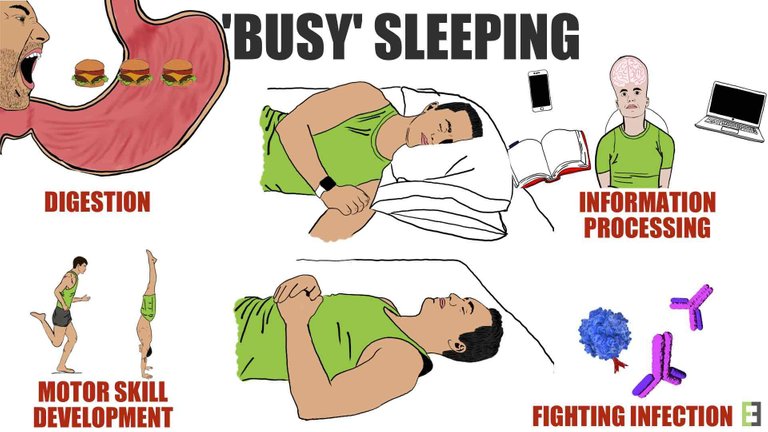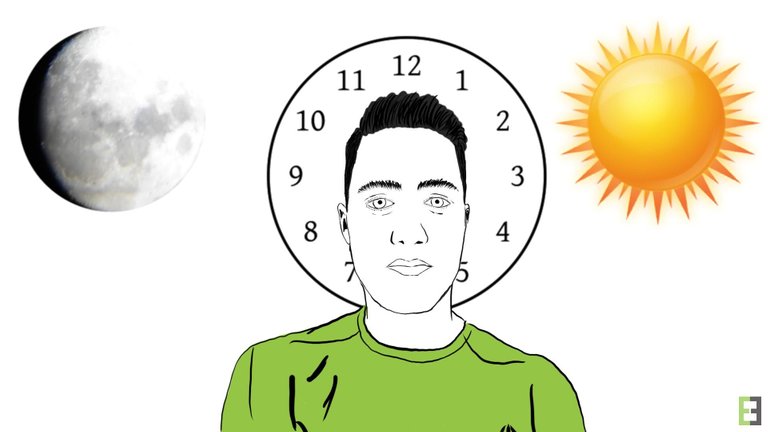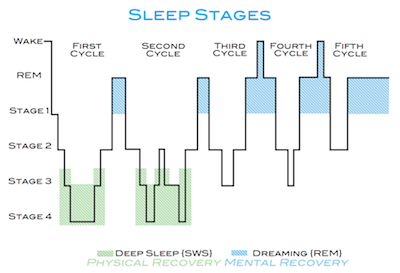
Is sleep really that important, or can it be sacrificed for more time spent towards ensuring success in our chosen careers?
Let’s look at things numerically: to be successful in any given field, we have to devote at least 10 000 hours to perfect the required skills. At 8 hours of work per day, five days a week, it would take someone around five years to achieve greatness.
For most of us, five years is too long to wait. Our first inclination is to sacrifice a few hours of sleep here and there to speed up the process.
Well, before you pat yourself on the back, after your next all-nighter, let’s take a look at why you could be slowing yourself down….
In this first of two posts, we will be discussing the importance of sleep and the mechanics of our sleep cycles.
Let’s take a look at some of the reasons why sleep is so essential for us:

Sleep is a way for us to rest and restore our bodies at the end of each day. It allows our brain to consolidate the many thoughts and emotions we experience on a daily basis. Without this sleep period, our judgment is clouded, and we are unable to make an informed decision, as efficiently as when we’re well-rested.
Do you want to avoid another sick day?
Well, during sleep, our immune system works to fight off infections and heal any physical trauma, conversely, sacrificing sleep will compromise our immune system.
It’s during this time that our digestive system labors to break down food, by shuttling fuel to our depleted muscle and liver stores. The essential vitamins and minerals are extracted and absorbed for the millions of functions that they are required for.
When we rest, our motor skills develop and our pathways myelinate. In other words: all the physical skills practiced during that day are forged in our muscle memory.
The cells in our body start regenerating and adapting to the stressors that were put on them that day.
Not convinced yet? Let's look at the mechanics of sleep:
How sleep happens:

Human beings are born with an innate sleep clock, known as our circadian rhythm, which regulates the time we spend awake and asleep. The accuracy of this biological time-piece depends on many environmental and cultural cues:
Environmental cues:
These are cues, which occur naturally, such as light and temperature. When the sun is shining and the temperature increases, it’s an indication for us to be awake, while a decrease in light and the temperature indicates that we’re meant to be asleep.
Cultural cues:
These are human-made cues that can become habit-forming. One example is the siesta- a daytime nap practiced by many countries that experience unusually hot climates, in the summer.
Our bodies respond to the circadian rhythm and its cues by releasing two hormones. The first is melatonin, which is released to help send us to sleep, while the adrenal hormone, cortisol, helps to wake us up.
Now that we have a basic understanding of our delicate internal timepiece and its mechanisms let’s decipher the unconscious happenings of sleep.
Our full night’s sleep is made up of many small repeated sleep cycles lasting from 90- 110min. Each sleep cycle is made up of NREM (non-rapid-eye-movement) and REM (rapid-eye-movement) sleep.
The ratio of time spent between NREM and REM sleep vary for each cycle.

Source
The first cycle will have the longest time spent in NREM sleep and the shortest time spent in REM sleep.
Each successive cycle will see a shortening in NREM sleep and lengthening in REM, but will not vary in its cumulative time.
This is why our deepest sleep tends to occur in the first half of the night and our “dreamiest” in the second. This phenomenon is also known as sleep architecture.
NREM sleep:
NREM sleep is associated with physiological change rather than psychological.
Here are some of the physical benefits, which occur during NREM sleep.
– Building and repair of muscle tissue
– The Release of Human Growth Hormone
– The release of testosterone.
– Building of motor patterns and skills
– Re-sensitization to insulin (necessary for prevention of type 2 diabetes)
REM sleep:
REM sleep ends each sleep cycle and is mostly associated with psychological changes, such as:
– An increase in brain wave frequency, closer to that of a conscious state
– A high occurrence of lucid dreams
– Consolidation of thoughts and emotions
– Development of short-term memory and learning
These two different cycles work in synergy with one another, creating a delicate balance that covers both the brain and body’s recovery needs.
It is clear that by sacrificing sleep, we’ll be sacrificing these crucial recoveries and restorative aids.
It's ironic, that, in our quest for greatness we end up becoming sleep deprived and less capable human beings.
Stay tuned for Part Two, where we show practical ways to improve your sleep quility.
Follow @exercisinghealth
Bibliography:
Colten, H., Altevogt, B. and Research, I. (2006). Sleep Physiology. National Academies Press (US). [online] Available at: http://www.ncbi.nlm.nih.gov/books/NBK19956/
India, P. (2015). Napping Reverses Damages Caused by Poor Sleep: Study. [online] NDTV.com. Available at: http://www.ndtv.com/world-news/napping-reverses-damages-caused-by-poor-sleep-study-738705
Wikipedia. (n.d.). Sleep and learning. [online] Available at: http://en.m.wikipedia.org/wiki/Sleep_and_learning
Omahen, D. (2009). The 10 000-hour rule and residency training. Canadian Medical Association Journal, [online] 180(12), pp.1272-1272. Available at: https://www.ncbi.nlm.nih.gov/pmc/articles/PMC2691450/.
*All images with EH logo were created by @exercisinghealth
After eating, I think sleeping is the most important thing we do in our everyday life to have a good health.
One hundred percent.
I always tell people; "don't sleep for 2 days straight, then, tell me if sleep is not important."
You got a 100.00% upvote from @voteme courtesy of @discernente! For next round, send minimum 0.01 SBD to bid for upvote.
Do you know, you can also earn daily passive income simply by delegating your Steem Power to voteme by clicking following links: 10SP, 25SP, 50SP, 100SP, 250SP, 500SP, 1000SP, 5000SP.
This is a nicely put together article. I've read more on sleep than i care to dream about but it's still good for a refresher.
Heading into my late 30's really f'ed with my sleep. Less melotonin production, harder to exercise, more worry about 'life' etc.
It's going ok right now though :)
Yes, it has been a hot topic over the past few years, and for a good reason.
Do you get enough sun exposure? Vitamin D is crucial for melatonin production. You must check your blood levels for that vitamin.
If you want to learn about sleep, go check out Dr Kirk Parsley's work. He is on the forefront of sleep research. (link to his website below)
http://www.docparsley.com
Thank you for this post. I wish I had thought about things more clearly when I was in my startup-company years. I probably would have been more effective and retained more knowledge had I allocated more time to sleeping!
Yes of course. You are way more productive when you run at full capacity.
There is also the sustainability factor. No one can maintain a hard work ethic for many years without sufficient rest and recovery.
very nice and informative,i followed u because u always share valuable content keep it up and keep sharing such posts.
Thank you! I am so glad you enjoyed the post!
Awesome, Informative and well written post, Thanks for sharing @exercisinghealth
Thank you for reading! I’m glad you enjoyed it.
Very good information on a crucial human trait, I'll look forward to part 2.
Thank you. I will post part two in 3 days.
i'm just here for postpromoter ;)
You got a 19.23% upvote from @postpromoter courtesy of @exercisinghealth!
Thanks for the reminder, time for bed.
Looking forward to part 2 ,thank you for the information, we could all give it a good use.
I an so glad you found the information useful. I look forward to posting part 2 and interacting with you again.